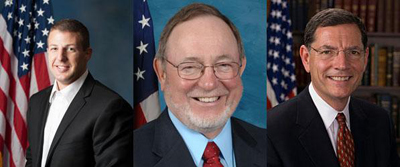By Rob Caprioccioso, Indian Country Today Media Network

While the tribal court inherent jurisdictional provisions of the Violence Against Women Act (VAWA) passed both chambers of Congress in February, and President Barack Obama subsequently signed them into law on March 7, the votes of three congressmen are getting special attention from Indian country.
Rep. Markwayne Mullin (R-Okla.), a Cherokee Nation citizen, voted against VAWA in the House, perplexing many of his fellow tribal citizens and other observers.
“Mullin, a Tea Party darling and Constitutionalist, ran a campaign on fiscal conservatism,” reflected journalist Aura Bogado in a blog post for The Nation. “Perhaps he didn’t like money being poured into a federal program that protects women. In the end, he was one of only 27 House Republicans who voted against both reauthorization versions. As a first-term lawmaker, he has already illustrated that he won’t necessarily stand with other Natives and their best interests in Congress.”
Mullin’s vote stood in stark contrast to that of fellow Oklahoma Republican Rep. Tom Cole, who paved the way for the House’s passage of the Senate version of VAWA that included the strong Native protections. Cole is a Chickasaw Nation citizen.
Sensing he had a PR nightmare on his hands, Mullin finally said it wasn’t the Native provisions that bothered him—it was the protections for LGBT families that persuaded his vote.
“The language regarding ‘sexual orientation’ in the bill’s non-discrimination provisions was unacceptable to me, and in my opinion had no place in a bill whose primary intent was to deal with protecting women from domestic violence,” Mullin wrote in a letter published by the Cherokee Phoenix later in March.
Then there was the temporarily perplexing situation surrounding Rep. Don Young (R-Alaska), who chairs the House Subcommittee on Indian and Alaska Native Affairs. He was expected to be an affirmative vote on the House bill. But when the final votes were tallied, he was a no-show.
What was going on? Had Young backtracked?
Nope, he explained. He was too sick to vote.
In a personal note he had posted to the Congressional Record, Young explained, “Mr. Speaker, on February 28, 2013, I was unable to vote because of medical reasons and missed roll call vote No. 55, on passage of S. 47, the Violence Against Women Reauthorization Act of 2013. Had I been present, I would have voted ‘yea.’ I strongly support reauthorization of the Violence Against Women Act (VAWA), which was delayed for far too long. I am pleased that Congress was able to overcome the obstacles that blocked its final passage. VAWA’s programs are a critical component of our Nation’s effort to reduce violence and care for victims. Reauthorizing VAWA will help Alaska, and the rest of the country, combat the epidemic of abuse and rape that plagues our families and communities.”
Young’s spokesman, Michael Anderson, elaborated on the situation, telling Indian Country Today Media Network, “Congressman Young had a minor medical issue late last month that didn’t allow him to fly from Alaska back to D.C. He is now clear to fly and will be back in D.C. this week.”
On the Senate side, there were a few senators who raised alarm bells surrounding their tribal VAWA positions, Sens. John McCain (R-AZ) and John Thune (R-S.D.) among them. But it was Sen. John Barrasso’s (R-WY) “no” vote that has most concerned Indian country, in no small part because he is the vice-chair of the Senate Committee on Indian Affairs.
Barrasso said he was concerned that the bill, which allows Indians to prosecute non-Indians for crimes committed on Indian lands, could be perceived as unconstitutional by the U.S. Supreme Court, so he didn’t want to risk Indians losing sovereignty over the matter.
Barrasso’s spokeswoman, Emily Lawrimore, explained, “As a doctor, Sen. Barrasso is very concerned about the problem of domestic violence in Indian country and supports measures that protect women and children. He voted against the recent VAWA bill because it contains provisions that would likely be ruled unconstitutional by the courts. A Supreme Court ruling against this provision could be damaging to tribal authority and have irreversible consequences.”
Ryan Dreveskracht, an Indian affairs lawyer with Galanda Broadman, found that to be a “weak position” since the Supreme Court has already ruled that tribes have the inherent power to prosecute non-Indians.
Read more at http://indiancountrytodaymedianetwork.com/2013/03/14/congressmen-explain-their-surprising-violence-against-women-act-votes-148182
